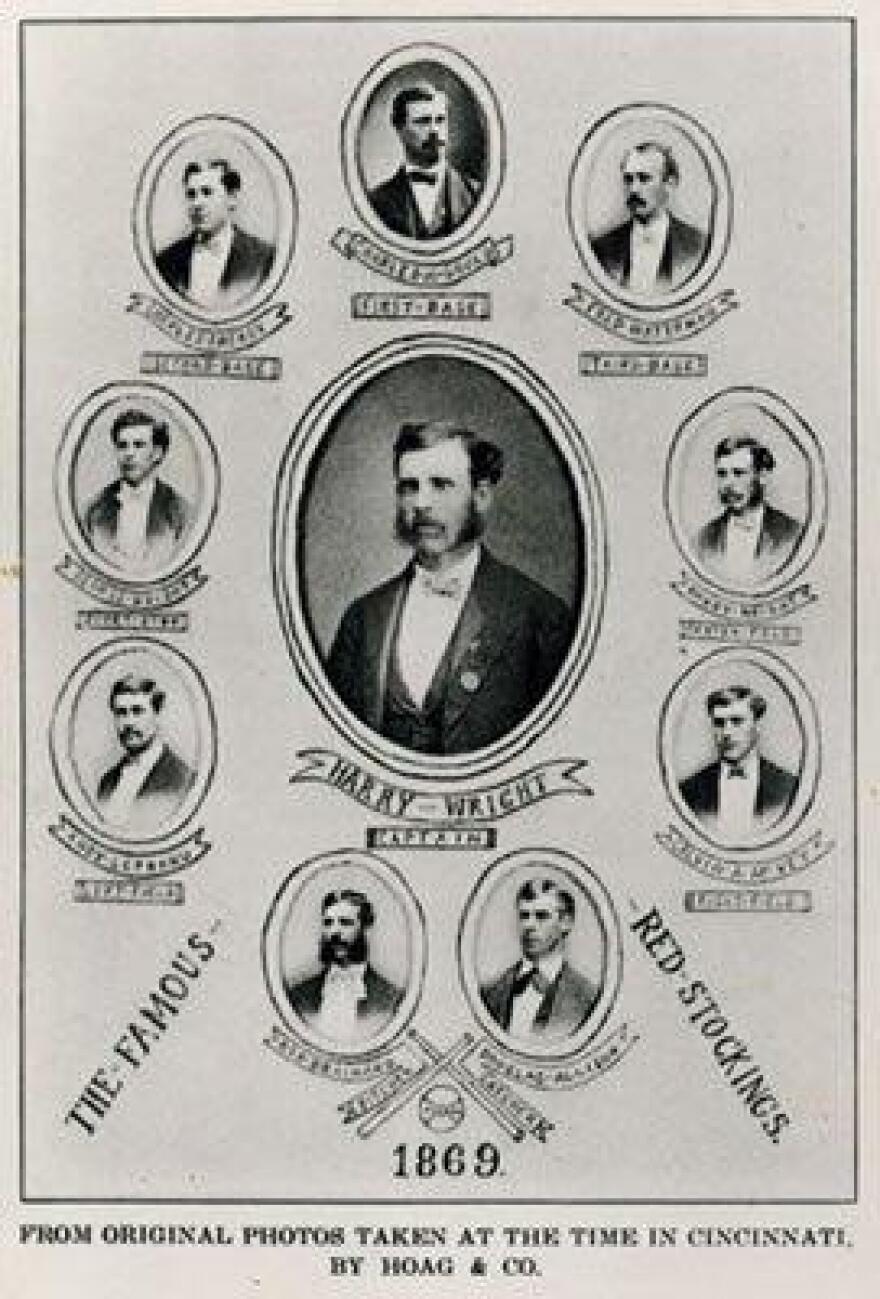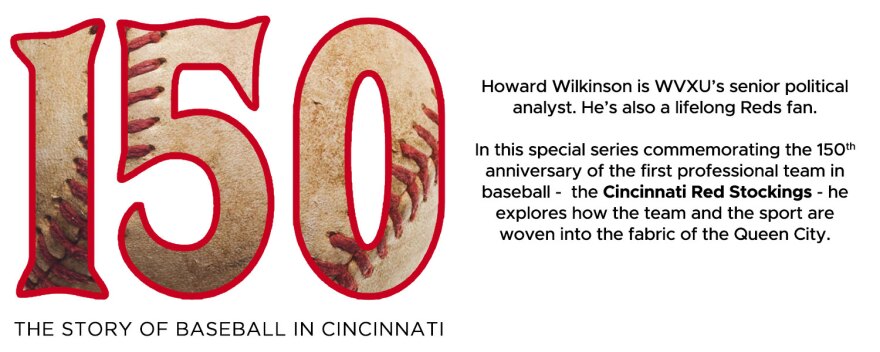Chances are, if you are a Cincinnatian, you have stood on the very ground where the 1869 Red Stockings – the first openly professional baseball club – played its home games.
And you probably didn't even know it.
Union Grounds, a former converted cricket field, was home to the cream of the crop when it came to baseball teams in the years after the Civil War, with its 57-0 record in the 1869 season.
And if you have stood at the Esplanade at Museum Center at Union Terminal, you have stood on some of professional baseball's most hallowed grounds.

They traveled 12,000 miles from coast to coast, playing teams from New England to California, winning every game they played. The 10 players who made up that team were the most famous ballplayers in the country; they sparked a nationwide passion for a game that, under its basic rules, was little more than 30 years old.
They were, as Major League Baseball's official historian, John Thorn has said, "the team that made baseball famous."
And, now, in a city where baseball took hold of its heart and soul and never let go, the present-day Cincinnati Reds are celebrating a year-long sesquicentennial of the original Red Stockings, and it is important to note a few things.
They were trailblazers, the first superstars of the game, but to say they were the first professional team is not accurate, according to Thorn.
It is more accurate to say the Red Stockings were the first openly professional team. There were many teams on the East Coast where players were paid – often under the table.
But the local attorneys who headed up the Red Stockings in their inaugural year of 1868 gave the team's leader and organizer, Harry Wright - a former cricket player born in England, who came to New York and was recruited to run the Cincinnati club - a wad of money, and told him to go find the best players in the country and sign them to play for the Red Stockings.
One of them was Harry's brother, George, a shortstop who was generally considered the best player in the land. He proved it, too, in 1869, earning his $1,400 salary by hitting about .630 with 49 home runs and scoring six runs per game.
Harry kept four players from the 1868 team and went out and recruited the rest. He included himself on the roster, of course, as centerfielder and manager at a salary of $1,200.
The only Cincinnatian who ended up on the 1869 roster was first baseman Charlie Gould, who was paid $800.
The Red Stockings disbanded after the 1870 season, but Gould went on to a good career with several National League clubs, including the Cincinnati Reds. He was even the player-manager of the Reds for a brief time near the end of his career.
Gould became a Cincinnati police officer after his playing days were over, and died in 1917. He is buried in Cincinnati's Spring Grove Cemetery. The grave of Cincinnati's first native son to play professional baseball was unmarked until 1951 when Reds' president Warren Giles started a campaign to place a marker at Gould's burial place, a marker which still stands.

The rest of the team was made up of pitcher Asa Brainard (paid $1,100); catcher Doug Allison ($800); second baseman Charlie Sweasy ($800); third baseman Fred Waterman ($1,000); left fielder Andy Leonard ($800); right fielder Cal McVey ($800); and substitute Dick Hurley ($600).
That’s a team payroll of $9,300.
Now, understand that while that may not sound like much money today, it was considerably more than the average working man was taking home in the late 1860s.
They were not being underpaid.
But then again, you have to look at where baseball has gone in the days since the Red Stockings in terms of payroll.
The Cincinnati Reds' team payroll in 2019 will be something just south of $130 million.
And, in more than 40 years of free agency in baseball, the money that top players – even some mediocre ones – command through their agents is breathtaking.
Earlier this week, third baseman/shortstop Manny Machado signed the largest free agent contract in baseball history - $300 million over 10 years with the San Diego Padres.
Machado is a very good player, but can you imagine what a .630-hitting George Wright would be worth in 2019 dollars?
It boggles the mind.
There is no way to exaggerate the sensation this seemingly unbeatable team caused across the nation. The Red Stockings made trips to the East Coast, to California, through the Deep South, shellacking every opponent they faced.
In 1870, the players were given $50 bonuses for their 57-0 season. The entire team stayed together and they won the first 24 games of the 1870 season.
Then, on June 14, 1870, the inevitable finally happened: The Red Stocking lost a game.
It was before a crowd of 9,000 at the Capitoline Grounds in Brooklyn.
Former Baseball Hall of Fame historian Lee Allen, a Cincinnatian and sometimes radio partner of Waite Hoyt on Reds radio broadcast, wrote in his Cincinnati Reds history that the Red Stockings were defeated by the Brooklyn Atlantics 8-7 in 11 innings.
The game was tied 5-5 after nine innings, Allen wrote. The Atlantics were willing to call it a draw, but Harry Wright's team wanted to play on and ended up regretting it.
Red Stockings president Aaron Champion announced the bad news to Cincinnati in a telegram:
new york, june 14, 1870 – atlantics 8, cincinnati 7. the finest game ever played. our boys did nobly, but fortune was against them. eleven innings played, though beaten, not disgraced.
The Red Stockings won their next 16 games. Five other defeats followed in 1870; attendance at the Union Grounds had fallen off dramatically and the magic of 1869 was a distant memory.
In November of 1870, the new president, A.P.C. Bonte, a Cincinnati picture framer, disbanded the club in a letter, reprinted by Thorn:
We have arrived at the conclusion that to employ a nine for a coming season, at the enormous salaries now demanded by the professional players, would plunge our club deeply into debt at the end of the year.
The 10 Red Stockings scattered to the four winds.
Harry and George Wright headed for Boston, and founded a club they called the Red Stockings. One might think that was the ancestor of today's Boston Red Sox, but it was actually the original Boston Braves who later moved to Milwaukee and, finally, Atlanta.
So, Harry and George Wright founded the Atlanta Braves.
Cincinnati was left with only memories of a team that seemingly could not be beat.
But they wouldn't be without professional baseball for long.
Editor's note: This is the first in a series of Reds-centric columns written by Wilkinson to commemorate the Reds and professional baseball's 150th anniversary. Look for it every other Friday, alternating with his "Tales from the Trail," through the end of the Reds' 2019 season. Up next: The two Reds teams that followed the Red Stockings in Cincinnati.




